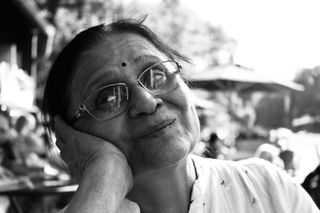
Little Big Things: The 78‑Year‑Old Grandmother Learning to Use a Smartphone
“It took me 12 to 14 months to learn how to use emojis, type messages in English. But now I think I’m perfect at it.”

In Little Big Things, we bring you stories of people who have rejected conformity and achieved success on their own terms.
Devyani Desai has always been a sociable person. Immensely interested in people’s lives — their troubles, their happiness, their vacations, and their kids — she derives the utmost pleasure from being a family woman. All her life, however, due to a strained marriage, poor finances and immense household responsibilities, she could never capitalize on that sociability — until one fine day, at 76 years old, her daughter got her a smartphone, and an entire world opened up to her.
“All the social energy I had bottled up in myself all these years, I can now expend it,” Desai said, adding that when she first figured out how to send messages on WhatsApp, she felt “on top of the world.”
(Full disclosure: Devyani Desai is the writer’s grandmother and the inspiration for this series.)
As a child, Desai grew up in a village several kilometers away from her school. Walking to and from school for several hours and then coming home to help with dinner preparations for her 16-person family took up all of her time. As much as she wished she could be a part of the after-school cultural activities in school, her parents had a strict 6 p.m. curfew, partly because their household had no electricity and all the kids needed to help out with housework at night. The only source of information and knowledge Desai had around at home was her grandfather, who would often wake her up in the middle of the night if he couldn’t sleep and tell her all about the novels he thought she should read; he even got her a Hindi magazine subscription so she could brush up on her language skills.
“I really wanted to study. There was a college nearby; my grandfather had promised me, ‘If you pass the SSC, I’ll put you in college.’ But then he died. The times were so: don’t educate the girls too much; marry them.”
Related on The Swaddle:
Little Big Things: The 42-Year-Old Paranormal Investigator and Demonologist
At 17, Desai was married to a much older man. Luckily, he cared about her education and made sure she became a graduate. But his lack of luck in business dealings led them down a path of crippling poverty, which prevented Desai from caring for anything else other than how to run the household and how to take care of her two daughters. Her love for information, and her desire for sociability were put on hold indefinitely — “Who would I have invited home? Whom would I visit?” — as she saw her husband through multiple failed ventures, alcoholism, and, eventually, a neurological issue that ultimately led to his death.
“I had spent my entire life taking care of others, with no money. For decades, I didn’t even buy a sari for myself. Luckily, despite our lack of resources, my husband had made sure my daughter was educated,” Desai said. “Today, I can sit in peace. Today, because of my daughter, I am living in a house, traveling in a car; because of her, there aren’t any money problems. Because of her, I have a smartphone.”
In 2017, when Desai was given that Samsung Galaxy phone, she had only dealt with technology in a minimal way — she knew how to dial numbers on landlines and pick up calls; same goes for the rudimentary mobile phone that succeeded the landlines. “With the touchscreen, it was so difficult. You had to now swipe to pick up calls. I couldn’t figure out where to put my finger. But slowly, I learned because when the first phone came and everybody around me started calling and messaging around me, I got frustrated — why don’t I know it?“
While Desai had put off trying to figure out modern technology partly because she found it daunting, she also knew that her brain had always gotten her through tough times. “Whenever there was any hardship, I always got up after the fall,” she said.
Learning to operate Facebook, for example, was a similar journey. Desai had had a customary education in English; while she may know what she wants to say, oftentimes, she is at a loss for words, their pronunciations, or their spelling. Being able to type messages was another challenge, as Desai says she could not tap the right button for the longest time, partly due to the fact that one of her eyes has had five surgeries and she can barely see out of it.
“It took me 12 to 14 months to learn how to use emojis, type messages in English. But now I think I’m perfect at it,” Desai says. “I can Google search, open any app, go to any website. I don’t have trouble accessing any of it. I thought, ‘I’m so great; I’m learning so much. I hadn’t seen any of this in my entire life.”
Desai starts every morning with a slew of ‘Good Mornings,’ both sent and received. “For one hour every morning, I send all my friends and followers good morning wishes. Then, I like all of my friends’ photos; if they are on vacation, I might comment and let them know I’m wishing them well. Then I go about my daily routine of making lunch and dealing with bills. In the afternoon, I check my phone again to respond to all the people who replied to my morning messages.”
Related on The Swaddle:
Little Big Things: The 52-Year-Old Housewife-Turned-Radio Announcer
Desai says keeping in touch with people, appreciating them, and giving them advice keeps her mental health strong. Because of Facebook, she now knows everyone’s birthdays — at the start of the month, she notes down all the birthdays Facebook reminds her of and makes sure to wish those people throughout the month. “When I send nice things to people, it makes me happy.”
Not all Facebook functionalities, however, are welcome, Desai says. Her brother keeps sending her an invite to join a local political group on the platform, which she says she has denied many times, partly due to lack of interest in politics and partly because the notifications from the group annoy her. The same goes for friend requests: “The more friends you have, the more notifications you get. So, I’m selective like that. A lot of people send me friend requests but I don’t accept all of them.”
As for the other apps on her phone, Desai often checks StarMaker, a karaoke singing app both of her daughters often post songs in. She says she likes to log on and hear their recordings; she also appreciates when StarMaker sends her a notification letting her know they have added extra songs to its options list. Desai also likes to frequent a Gujarati short stories app, especially when the newspaper is late in the morning.
Being able to use technology has helped Desai be up-to-date on her family and friends, has made her feel less alone, and has opened up avenues for her to consume information she doesn’t normally get from her normal rotation of Gujarat Samachars and Chitralekhas.From motivational speeches that inform her about nuances of mental health issues to debates with her family online, Desai has gained a community of people and ideas by mastering her smartphone.
“I am at home but I can’t sit idle. I need to do something and I like technology — if I had been born in this era, I could have done so much. I know my abilities. One minus point is my age,” Desai says, commending all the young women she sees on social media making their own websites and capitalizing on their skill. Desai thinks with a little help she could easily open up a cooking show/recipe website for herself — “After all, I’m sure I could do it much better than some of those videos I’ve seen on Facebook.”
Rajvi Desai is The Swaddle's Culture Editor. After graduating from NYU as a Journalism and Politics major, she covered breaking news and politics in New York City, and dabbled in design and entertainment journalism. Back in the homeland, she's interested in tackling beauty, sports, politics and human rights in her gender-focused writing, while also co-managing The Swaddle Team's podcast, Respectfully Disagree.
Related


Why Do We Crave and Distrust Kindness Simultaneously?
